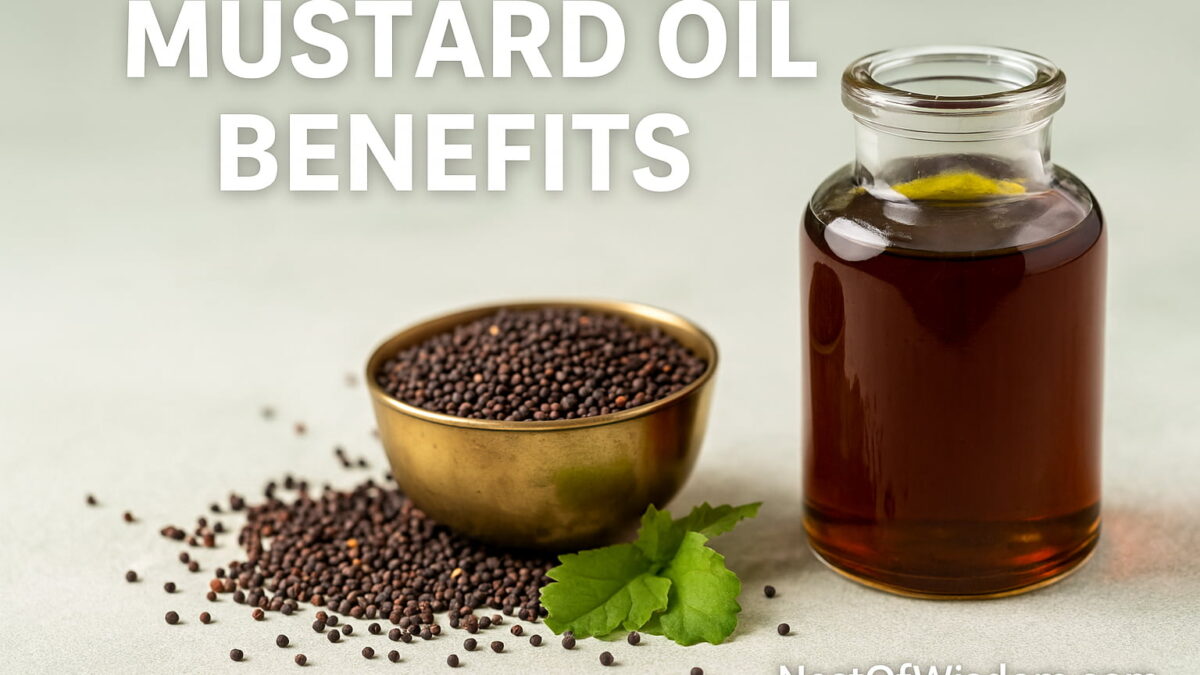Mustard Oil Benefits have been celebrated in ancestral kitchens for centuries—especially across North and East India—yet modern conversations often get stuck on labels and regulation. This guide brings tradition and science together so you can understand Mustard Oil Benefits clearly, use it safely, and decide where it fits in a balanced oil rotation. “அடிப்படை அறிவோடும் அளவோடும் பயன்படுத்தினால், நன்மை அதிகம்.”
Table of Contents
- Introduction
- What Is Mustard Oil?
- Composition, AITC & Smoke Point
- Mustard Oil Benefits: Evidence-Backed Advantages
- Best Uses in Cooking (Heat, Dishes, Pairings)
- Safety & Regulations: Erucic Acid, Labels & Limits
- How to Choose, Store & Use Wisely
- Where It Fits Among Traditional Oils
- How to Read Labels (Edible vs External-Use)
- Allergy & Who Should Be Careful
- Myths vs Facts
- Quick Recipes & Pairings
- FAQs: Mustard Oil Benefits
- Conclusion
- References
Introduction
Across Bengali, Punjabi, Odia, and Assamese kitchens, Mustard Oil Benefits show up as signature aroma, robust flavor, and versatility—from tempering to pickling. Science adds useful context: a predominantly unsaturated fat profile, the aroma compound AITC, and high heat tolerance for refined variants. The key to unlocking Mustard Oil Benefits is balance—quality sourcing, appropriate heat, moderate portions, and rotation with other traditional oils. “சமையலில் சமநிலை வெற்றியின் ரகசியம்.”
What Is Mustard Oil?
Mustard oil is pressed from seeds of Brassica species (commonly Brassica juncea). Cold-pressed (wood/ghani/chekku) oils retain aroma and bioactive compounds; refined mustard oil is milder and generally tolerates higher heat. Culinary mustard oil is naturally pungent due to allyl isothiocyanate (AITC)—the “sinus-opening” note also found in mustard, horseradish, and wasabi. When used with mindful portions, Mustard Oil Benefits the home cook who wants bold flavor with small quantities.
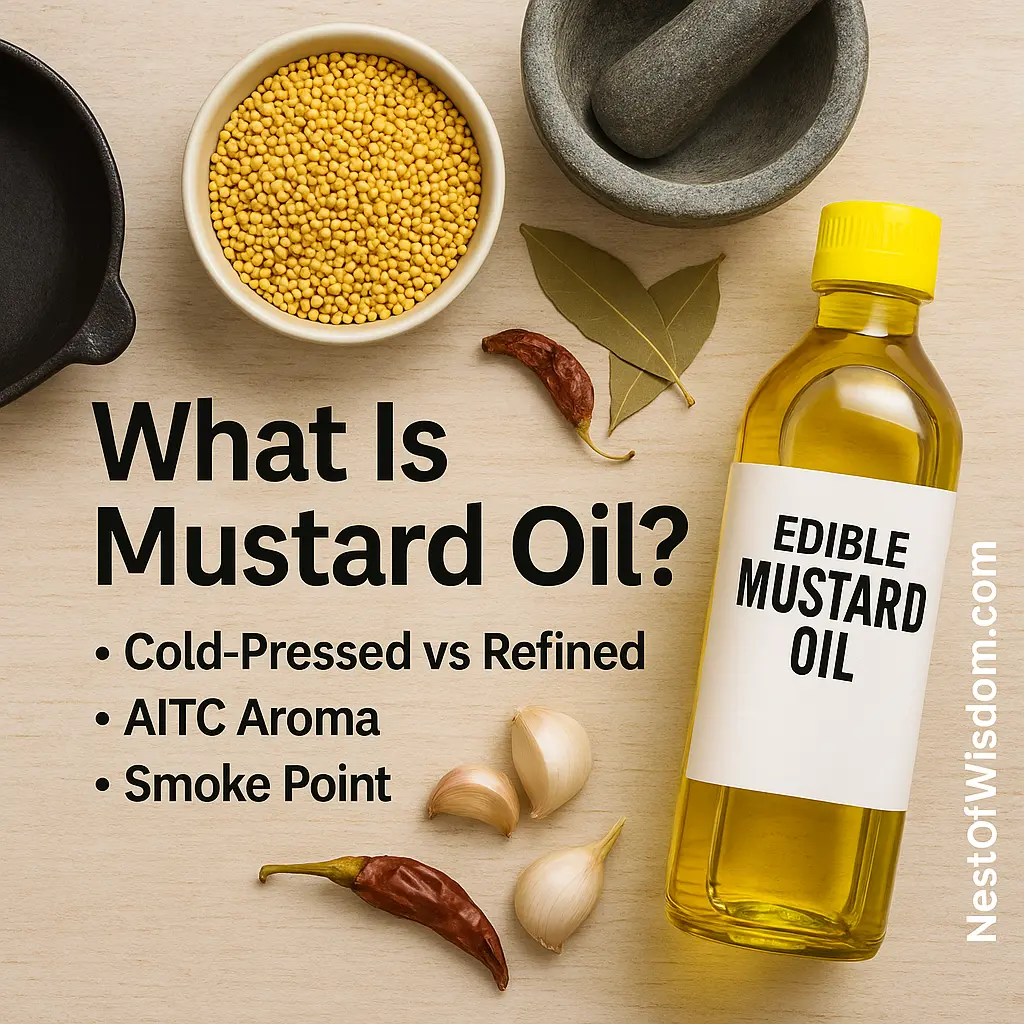

Composition, AITC & Smoke Point
- Fatty-acid profile: Mustard oil typically contains a high share of monounsaturated fat, including erucic acid (varies by varietal and processing), along with oleic and linoleic acids; ALA (omega-3) appears in smaller amounts. This underpins several culinary Mustard Oil Benefits like mouthfeel and satiety.
- AITC (Allyl Isothiocyanate): Created from the glucosinolate sinigrin via myrosinase, AITC is responsible for the characteristic pungency and is widely studied in food science for antimicrobial activity in model systems. In sensible kitchen practice, AITC contributes to the signature flavor that many associate with Mustard Oil Benefits.
- Smoke point: Refined mustard oil is commonly listed near ~250 °C (~480 °F). Cold-pressed variants handle moderate-to-medium-high heat but avoid repeated overheating. “வாசனை காக்க மிதமான சூடு, அதிக வெப்பம் வேண்டாம்.”
Mustard Oil Benefits: Evidence-Backed Advantages
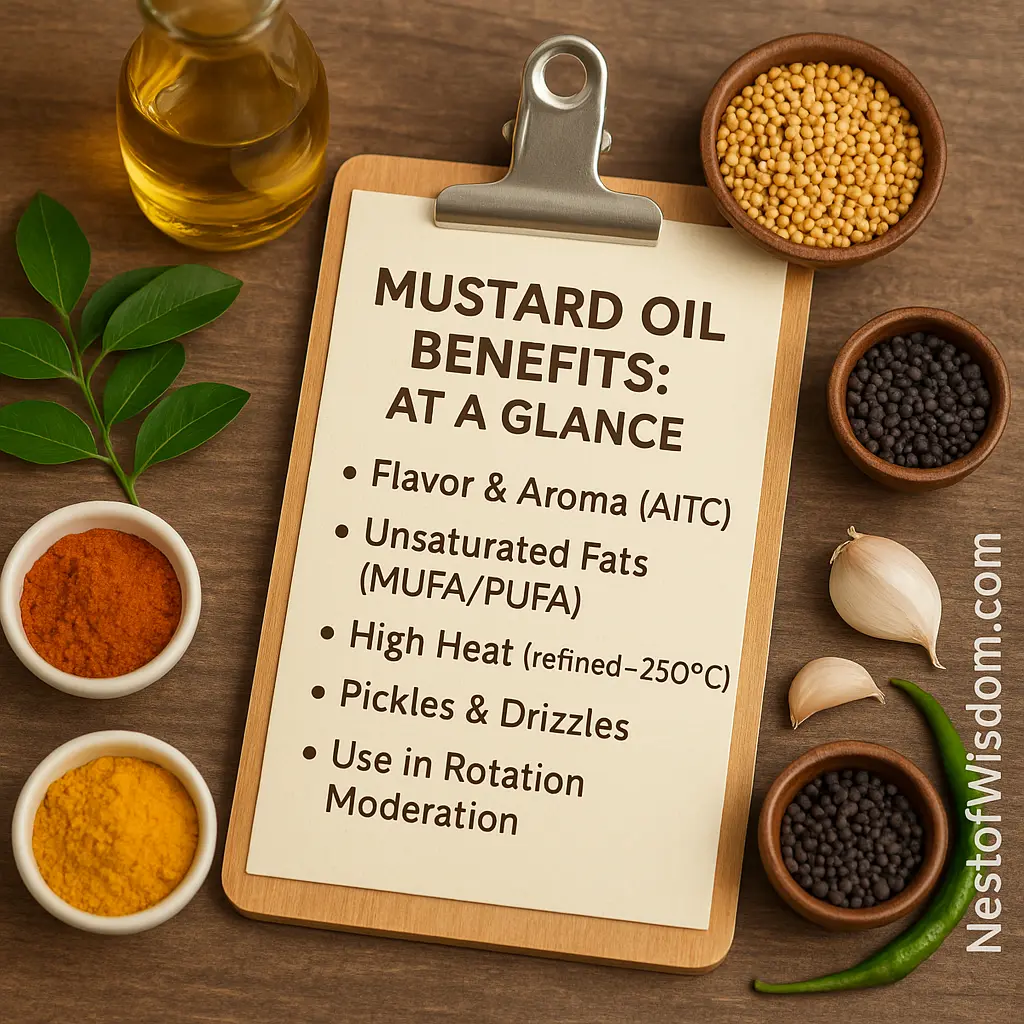

1) Kitchen Hygiene & Flavor Activation
AITC shows antimicrobial activity in controlled lab conditions against select organisms in model systems. While your kitchen isn’t a lab, this provides a rationale for one traditional Mustard Oil Benefit: a cleaner-tasting sauté where spices “bloom” beautifully. Always prioritize safe food handling over any theoretical effect.
2) Heart-Smart Pattern (When Used Wisely)
Dietary patterns richer in unsaturated fats (MUFA/PUFA) are generally favorable compared with high-saturated-fat patterns. Mustard oil contributes unsaturated fats, but its erucic-acid content is why some countries regulate edible use. Practical takeaway: focus on quality + portion + rotation to keep Mustard Oil Benefits aligned with heart-smart habits.
3) Winter Comfort & Digestion
Many homes prefer mustard oil in cooler months for its warming aroma and mouthfeel. As part of a wholesome plate of lentils, greens, and whole grains, it supports satiety and home-cooking consistency—indirect Mustard Oil Benefits that reduce reliance on ultra-processed alternatives.
4) Pickling Power & Signature Aroma
For pickles and bold gravies, the pungency of cold-pressed mustard oil delivers distinct flavor with small quantities—useful for portion control without sacrificing satisfaction. The ability to use less while tasting more is one of the underrated Mustard Oil Benefits.
5) High-Heat Versatility (Refined)
Refined mustard oil’s high smoke point makes it suitable for quick high-heat methods (wok stir-fries, shallow fry), supporting texture without overpowering flavor. Avoid repeated reuse to preserve quality and the long-term Mustard Oil Benefits you’re aiming for.
6) Culinary Synergy with Spices
Mustard oil pairs naturally with mustard seeds, fenugreek, curry leaves, garlic, and fish—enhancing volatile aromatics and delivering a cohesive flavor base across East/North Indian cuisine. This synergy helps Mustard Oil Benefits shine in regional recipes.
7) Cultural Topical Use (Massage)
Traditionally used for body/scalp massage in some regions; it provides slip and warmth. Evidence for specific therapeutic claims is limited. Patch-test first; avoid using on infants without pediatric guidance. “சருமம் சென்சிட்டிவ் என்றால் முதலில் சோதனை செய்யுங்கள்.”
8) Cost-Effective Flavor Delivery
Because mustard oil is pungent, small amounts go a long way—useful when managing budgets or calories while preserving the “restaurant-level” aroma at home. Sensible cooks appreciate how Mustard Oil Benefits both taste and thrift.
9) Fits a Rotational Oil Strategy
Rotating oils improves flavor variety and balances fat profiles over time. Combine Mustard Oil Benefits with sesame, groundnut, coconut, and ghee based on dish and heat so you enjoy diversity without excess.
Best Uses in Cooking (Heat, Dishes, Pairings)
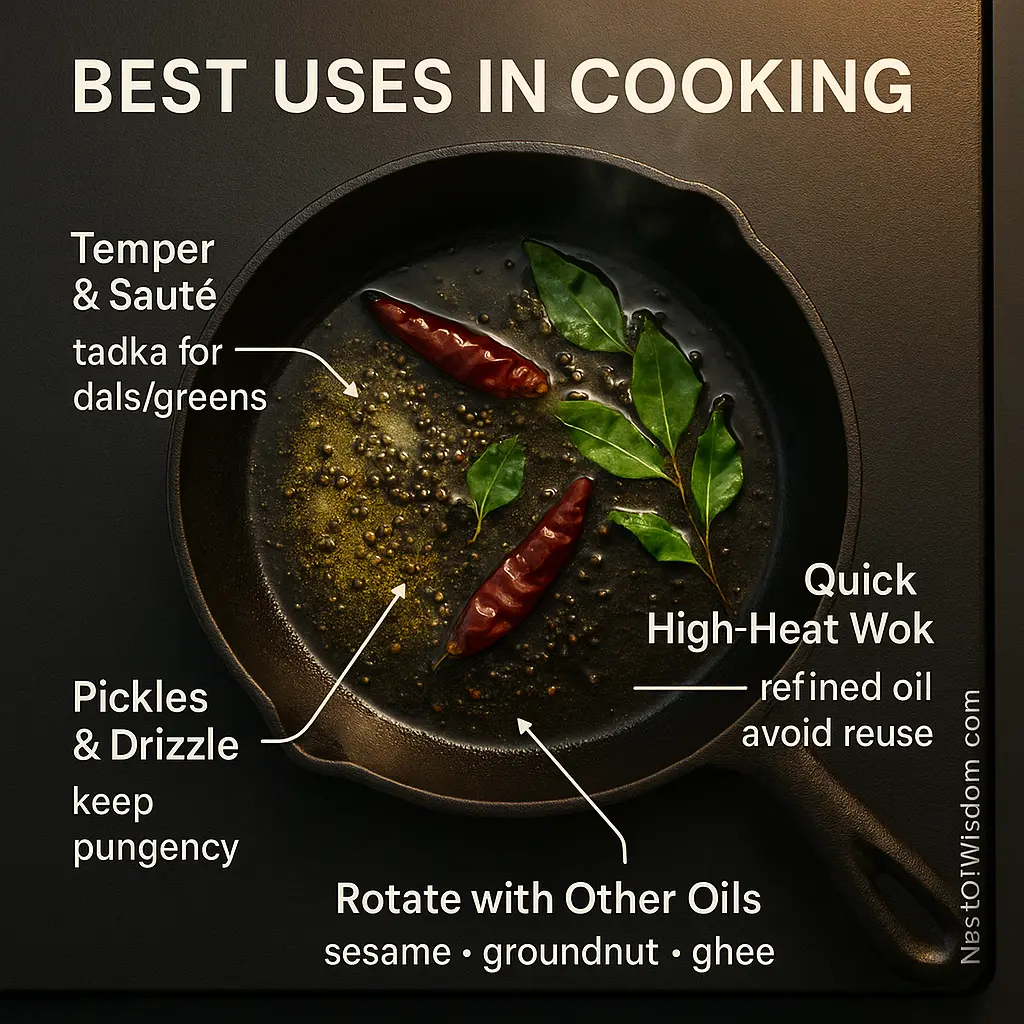

- Temper & sauté: Use cold-pressed for tadka (mustard seeds, red chilli, curry leaves, garlic). Great for dals, leafy-green sautés, and fish curries where Mustard Oil Benefits the finished aroma.
- Quick high-heat wok: Choose refined mustard oil for stir-fries and shallow frying. Keep temperatures controlled; avoid repeated reheating.
- Pickles & finishing drizzle: Pungency shines—add at the end to retain aroma and target specific Mustard Oil Benefits like flavor intensity at low quantity.
- Rotation idea: Mustard for bold gravies/fish; sesame (antioxidant-rich medium heat); ghee (very high heat tadka); groundnut (neutral for frying); coconut (South-Indian flavor, light sauté).
“உணவின் சுவை—சரியான எண்ணெய், சரியான சூடு.”
Safety & Regulations: Erucic Acid, Labels & Limits
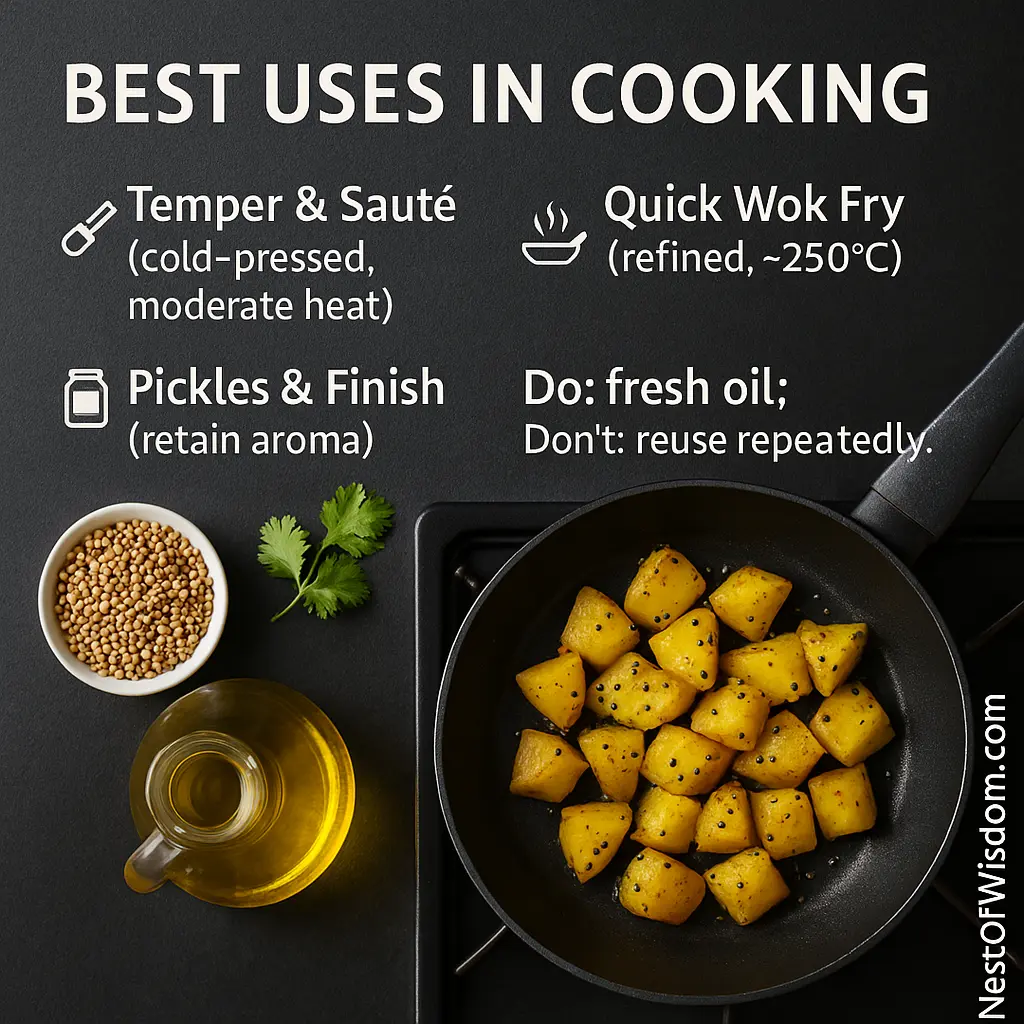

- Erucic acid: Safety bodies have reviewed exposure and set precautionary intake thresholds. Practical takeaway: use mustard oil in moderation and as part of a rotation with other oils.
- European guidance: EFSA established a tolerable daily intake (TDI) for erucic acid and assessed exposure ranges; some highest intakes in children can approach the TDI, supporting moderation.
- United States: Expressed mustard oil for culinary use faces import/label restrictions; many bottles are sold “For External Use Only.” Low-erucic edible variants exist—always follow the label and local rules.
- India: Edible mustard oil is common; authorities have acted on blending/adulteration and quality standards over time. Buy reputable, tested brands and check labels.
Bottom line: The safest path to consistent Mustard Oil Benefits is moderation, rotation, and following the food rules where you live. “அளவு காப்போம்; ஆரோக்கியம் காப்போம்.”
How to Choose, Store & Use Wisely
- Quality: For bold aroma, choose cold-pressed (wood/ghani) from a reliable brand; for high-heat wok/shallow-fry, pick refined edible mustard oil that meets your region’s standards.
- Freshness: Buy smaller bottles if you cook infrequently; store away from heat, light, and moisture. Discard oil that smells rancid. These habits protect the flavor-driven Mustard Oil Benefits you want.
- Heat practices: Use medium-high heat for cold-pressed; avoid smoking; don’t re-use oil repeatedly.
- Balanced plate: Focus on vegetables, lentils, whole grains, and nuts. Oil is a garnish—flavor first, quantity second. “அளவான எண்ணெய்—அழகான ஆரோக்கியம்.”
Where It Fits Among Traditional Oils
Compared with other fats we’ve covered, Mustard Oil Benefits are unique for pungency and AITC-driven aroma:
- Vs Sesame Oil: Sesame brings sesamin/sesamol antioxidants and a nutty finish; mustard brings sharp pungency and (refined) higher heat tolerance.
- Vs Coconut Oil: Coconut suits light sauté/tempering with a sweet aroma; mustard gives savory punch, great with greens and fish.
- Vs Ghee: Ghee excels at very high-heat tadka and comforting mouthfeel; mustard adds boldness to curries and pickles.
- Vs Groundnut Oil: Groundnut is neutral, vitamin-E rich for frying; mustard offers bolder flavor and the AITC kick.
- Topical/medicinal oils differ: see Castor Oil Benefits.
How to Read Labels (Edible vs External-Use)
- Edible mustard oil: Labeled for cooking, typically sold in India and other markets where permitted. This is the safest route to realize everyday Mustard Oil Benefits in food.
- “For External Use Only”: Common in the U.S.; indicates it isn’t permitted there as a cooking oil. Don’t use these for food.
- Low-erucic / canola-type: Look for explicit statements if you need low-erucic options. Verify brand testing.
- Batch testing & reputation: Prefer brands that publish quality/safety data or hold relevant certifications.
“லேபிள் கவனமாகப் படியுங்கள்—அதே சிறந்த பாதுகாப்பு.”
Allergy & Who Should Be Careful
- Mustard allergy: If you have a known mustard/Brassica allergy, avoid culinary use and consult your clinician.
- Infants/young children: Be conservative with pungent oils; follow pediatric guidance for topical use; keep portions modest in food.
- Specific medical conditions: If you’ve been advised to follow particular fat limits or avoid certain foods, personalize with your healthcare professional so any Mustard Oil Benefits align with your plan.
Myths vs Facts
- Myth: “Mustard oil is always unsafe.”
Fact: Edibility depends on region and product label. In places where edible mustard oil is permitted and properly labeled, moderate culinary use can fit a balanced diet. This is where realistic Mustard Oil Benefits apply. - Myth: “More heat gives more flavor.”
Fact: Excess heat can degrade oil and spices. For the best Mustard Oil Benefits, use moderate heat for cold-pressed and controlled high heat for refined. - Myth: “Mustard oil alone guarantees heart health.”
Fact: Overall diet and lifestyle matter more. Use small amounts, rotate oils, and prioritize vegetables, legumes, and whole grains.
Quick Recipes & Pairings
Three fast ideas that showcase Mustard Oil Benefits without complexity:
- Leafy Greens Stir-Fry (10 min): Heat 1–2 tsp cold-pressed mustard oil; temper mustard seeds + garlic + red chilli; toss chopped spinach/amaranth; finish with a squeeze of lemon. Bold flavor with minimal oil.
- Fish Curry Base: In refined mustard oil, sauté onions, ginger-garlic, and tomatoes; add turmeric, chilli, coriander. Slip in fish pieces; simmer. A classic that lets Mustard Oil Benefits sing with seafood.
- Pickled Carrot/Chilli: Warm cold-pressed mustard oil gently; pour over julienned carrots/green chillies with mustard seeds, fenugreek, vinegar, salt. Rest overnight for a quick relish.
“சிறிதளவு எண்ணெயில் பெரிய சுவை—அதுதான் கிளவுட்… இல்லை, மஸ்டர்ட் எண்ணெயின் மந்திரம்!”
FAQs: Mustard Oil Benefits
1) Is mustard oil safe to eat?
It depends on local rules and the product label. In India and several countries, edible mustard oil is common. In the U.S., many bottles are labeled “For External Use Only” due to erucic acid concerns; some low-erucic edible variants exist. Follow your region’s regulations and labels.
2) What makes the aroma so pungent?
Allyl isothiocyanate (AITC) creates the signature “wasabi-like” kick. It’s formed when enzymes act on mustard seed glucosinolates during processing/cooking, a sensory hallmark behind many Mustard Oil Benefits in taste.
3) Can I deep-fry in mustard oil?
Refined mustard oil tolerates higher heat (≈250 °C listed). For best results, keep temperatures controlled, don’t reuse oil repeatedly, and use fresh batches.
4) Does mustard oil improve heart health?
It contributes unsaturated fats, which can support heart-smart patterns when replacing some saturated fats. However, erucic acid drives regulatory caution. Use modest portions and rotate with other oils so Mustard Oil Benefits fit your broader plan.
5) Is mustard oil good for baby massage?
It’s traditional in some regions, but infant skin is delicate. Use only with pediatric guidance; many families prefer gentler oils (e.g., coconut/sesame) for infants.
Conclusion
Mustard Oil Benefits include bold flavor, kitchen versatility, and a unique AITC-driven profile that complements Indian/Tamil recipes. Tradition also teaches moderation: buy edible, tested oil; respect heat; use modest amounts; and rotate with other oils. With those guardrails, mustard oil becomes a powerful part of an ancestral-meets-modern kitchen. “சமையலின் ஞானம்—அளவில், தரத்தில்.”
Related on NestOfWisdom: Coconut Oil Benefits · Sesame Oil Benefits · Ghee Benefits · Groundnut Oil Benefits · Castor Oil Benefits
References
- EFSA — Erucic acid in feed and food (TDI & exposure guidance)
- EFSA Press — Erucic acid: risk note for highly exposed children
- U.S. FDA Import Alert 26-04 — Expressed mustard oil status
- FSSAI — 2021 note on blending/adulteration context (India)
- Scientific review — Isothiocyanates & antimicrobial activity (overview)
- Smoke points list — Refining & heat tolerance (approximate)
Nest of Wisdom Insights is a dedicated editorial team focused on sharing timeless wisdom, natural healing remedies, spiritual practices, and practical life strategies. Our mission is to empower readers with trustworthy, well-researched guidance rooted in both Tamil culture and modern science.
இயற்கை வாழ்வு மற்றும் ஆன்மிகம் சார்ந்த அறிவு அனைவருக்கும் பயனளிக்க வேண்டும் என்பதே எங்கள் நோக்கம்.
- Nest of Wisdom Authorhttps://nestofwisdom.com/author/varakulangmail-com/
- Nest of Wisdom Authorhttps://nestofwisdom.com/author/varakulangmail-com/
- Nest of Wisdom Authorhttps://nestofwisdom.com/author/varakulangmail-com/
- Nest of Wisdom Authorhttps://nestofwisdom.com/author/varakulangmail-com/
Related posts
Today's pick
Recent Posts
- Internal Linking Strategy for Blogs: A Practical, Human-Centered Playbook
- AI in the Automotive Industry: A Practical, Human-Centered Guide
- Cloud Tools for Small Businesses and Freelancers: The Complete Guide
- Generative AI in Business: Real-World Use Cases, Benefits & Risks
- 7 Life-Changing Daily Habits for Weight Loss Without Dieting

